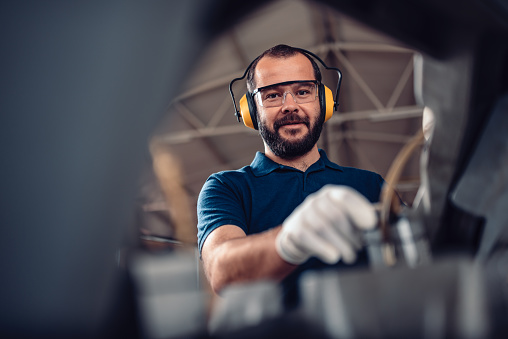Peter, 35, grew up with a single mother who was later diagnosed with bipolar disorder, complicating his and his sister’s childhoods.
Peter smoked a great deal of marijuana starting in eighth grade and all through high school. He struggled to find friends and often used with the ones he had to mask or relieve some of the shyness and anxiety he felt.
After graduating high school, Peter got a job. He and his partner worked and had their two children as Peter attended school at night. He then worked in social services and for Department of Human Services (DHS) for a period before being laid off due to budget cuts.
After a bit of unemployment, Peter got a job in a factory, where his substance use eventually began. Working long, grueling hours, using pills, marijuana, and meth was a part of the culture and let Peter be able to work overnight while making time for his family during the day, relieving the physical demands of his job.
“I mean, like, we were working, some days, seven days a week, you know. I also started get like... resin burns on my arms from workin’ there, you know. So that's when the...I don't know, the whole pain pill thing hurt, you know. And then you wouldn't notice them or anything and if you're high on methamphetamine then you definitely didn't notice them…Like my boss, you know. It wasn't...you know, we had two UAs a year. You knew one came in January and you knew one came in July. You make sure you're clean then or whatever. But no, I mean, people were...I saw people smoke pot and mainly drink a lot, you know, in the field or whatever. That made...so that made it...me think that maybe it was okay, you know. If they're doin’ it, and they're doin’ it, and look look at them, I mean, like, she's making double my salary.”
Prioritizing his mental health
After about two or three years, Peter and his partner’s brother-in-law were using together, which created friction, as did the listing of his OWI charges in the newspaper.
A large factor in Peter’s decision to get clean was his mental health, as anxiety was something he has struggled with for most of his life. Mental health support has enabled him to form stronger relationships and find support for recovery and mental health in his sobriety.
“I know a lot of people from, like -- I work here in town. I know a lot of people from work. Like I said, I coached my kid's Little League and football league. I know a lot of people from there. My, ah, girlfriend's a schoolteacher, so of course I know a lot of people associated with the whole school thing… I go to NA meetings ever Friday night at seven. So, I know people there too. I'm not looking and I...I'm not anti-social or nothing, but I'm very careful…being a male and like you know in a society that, like, you know, men, there's a persona. You know, men are tough guys, you know. They can handle anything, you know, whatever. And, ah, finally just swallowing that pride and goin’, you know, and gettin’ my mental health in check…I went up there to get my mental health thing taken care...you know what I mean. Like, I knew what I had to do.”

“I definitely want to be around to see that”
In five years, Peter hopes to be able to have more meaning and security in his life as he looks forward to all that he will experience.
“I want to be more family-oriented, putting my family [first]. My son will be almost graduating from high school, you know. And there's a point in time in my life where, ah, I didn't even know if I would make that. So, you know, I definitely want to be around to see that. My daughter will be ten. Like I said, I still got, I still got to be on this earth for a little while longer, you know, if I want to see the things I want to see…yeah, I just want to be more connected. Have more meaningful relationships with people, you know. And church...I mean I, I, we've, I, I've so seriously talked about church, you know. And, like, that's somethin’ that, I mean, there's one right up here. And one Sunday I just might walk right in there, you know, and be like, ‘Hey, I'm right here.’”
Peter is, for now, content working to build back his relationship with his partner, taking care of his five-year-old daughter and 13-year-old son. He has a job he enjoys and has an interest in furthering his education farther down the line.
“Ah, yeah, been clean, um, God. I graduated from community treatment July fifteenth, and so I've been clean up until now. I have a sponsor here. I go to NA meetings every Friday night. I work at a plastics, I work at a plastics place here. Factory job. Love it, you know. Maybe once my daughter gets to, you know, older, I might go pursue a master’s degree in Psychology, but for right now, I just kinda like workin’ the factory stuff, you know. It's pretty easy, you know. People are pretty mellow.”
